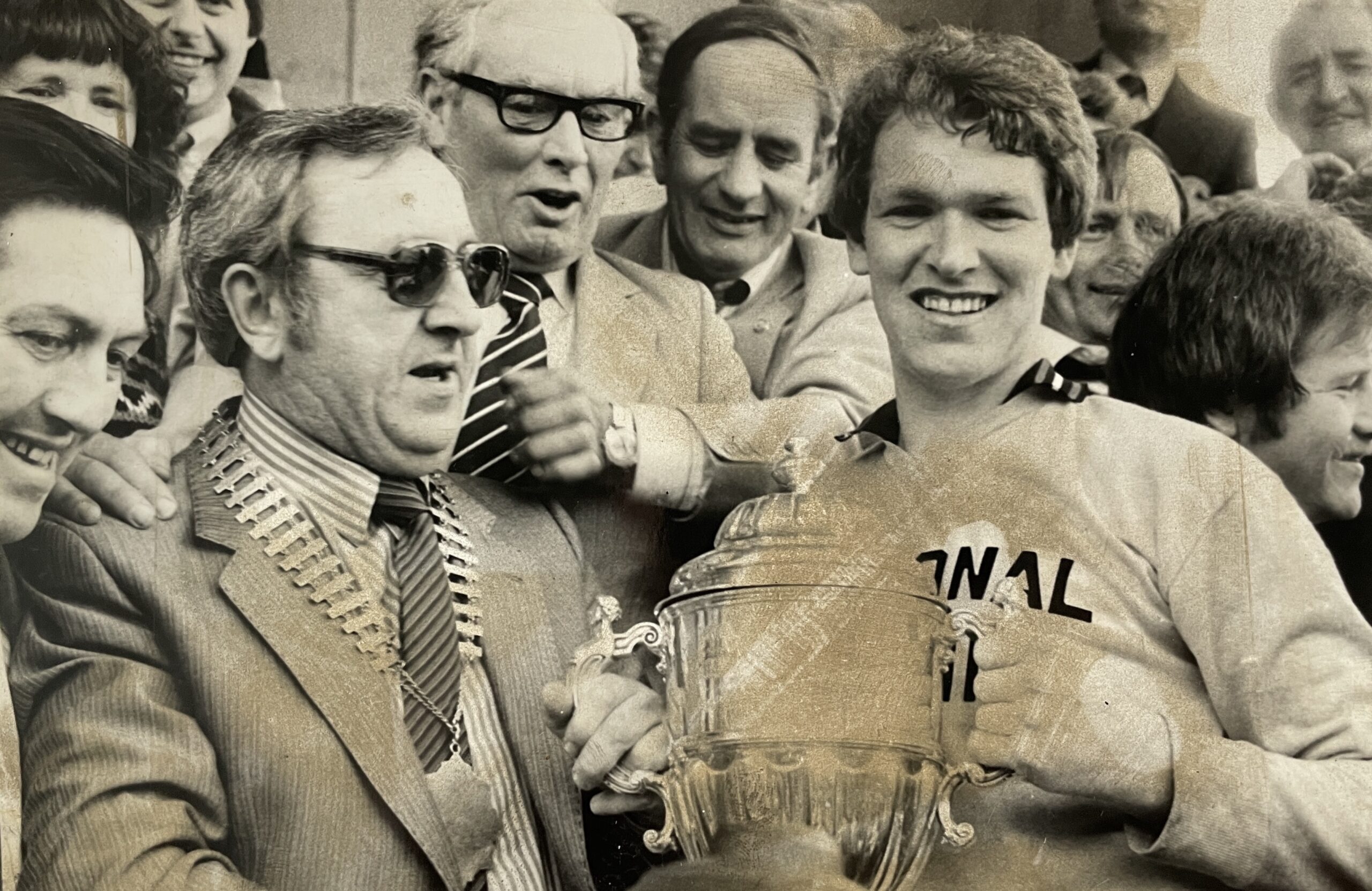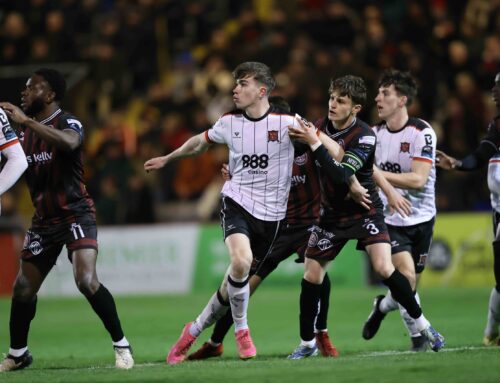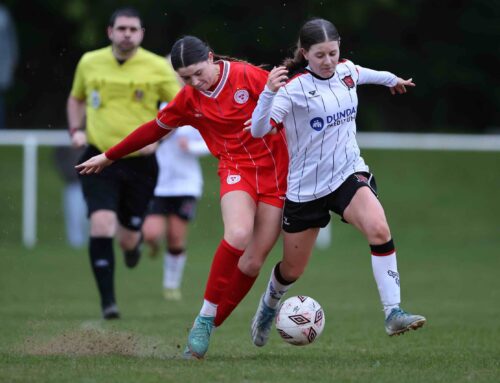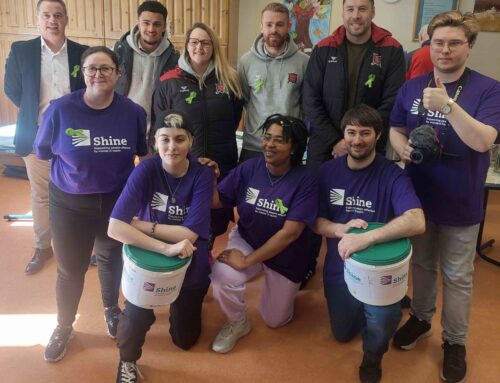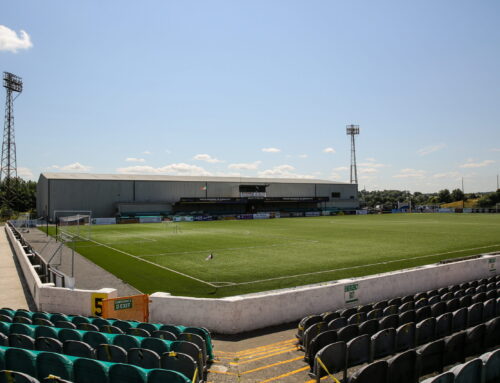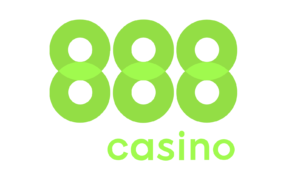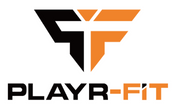It’s 40 years on since Jim McLaughlin’s brilliant Dundalk team were crowned as league champions with a final day victory over Athlone Town at St Mel’s Park. We take a look back at a memorable campaign that saw the Lilywhites go toe-to-toe with Spurs, produce an epic four-game FAI Cup semi-final tie with Bohemians, and pip Shamrock Rovers and Bohs to the post in one of the League of Ireland’s most exciting title races.
Despite finishing the 1980/81 campaign as league runners-up and FAI Cup and League Cup winners, the run-in to the 1981/82 season saw plenty of question marks hanging over Jim McLaughlin and his squad of serial winners. Top of McLaughlin’s ‘to-do’ list at Oriel Park was to find a replacement for his captain, and lion heart, Dermot Keely. After being hit with a six-game ban, Keely decided that enough was enough and he signed for Glentoran. “I will miss playing for Dundalk but I won’t miss playing League of Ireland football,” he said.
Vinny McKenna, Synan Braddish and Mick Lawlor also left for pastures new and speculation grew that Pop Flanagan, Mick Fairclough and Martin Lawlor would all follow the through the departure gates. Thankfully, things settled down as the season approached and McLaughlin’s solution to the Keely conundrum was close at hand as Tommy McConville shunted side to partner Paddy Dunning at the heart of the back four with new signing Eamonn Gregg taking over at right-back.
The return of Hilary Carlyle, who only managed 21 appearances across two injury-hit seasons before that, was a welcome boost, as was the regular sighting of a local youngster’s name on the team sheet. Born and bred in Dundalk, Barry Kehoe went on to play 47 times for the Lilywhites that season and was an integral part of the league-winning side.
After finishing as runner-up to Athlone Town, McLaughlin’s side were already guaranteed a place in the UEFA Cup but the FAI Cup win over Sligo Rovers meant that Dundalk would enter the European Cup Winners Cup for the second time in the club’s history. After losing 2-1 in Iceland, a ruthless 4-0 win at Oriel Park in the return leg saw Fram Rekjavik dispatched in the first round. It was the club’s biggest win in Europe and stretched the unbeaten European run at Oriel Park to seven games. The reward – a tie against Tottenham Hotspur in round two – was pretty attractive, to say the least!
A star-studded Spurs side, including the likes of Ray Clemence, Chris Hughton, Ossie Ardiles, Steve Archbald, Tony Galvin, Glen Hoddle and Garth Crooks arrived at Oriel Park for the first leg on October 21st, 1981. The bare statistics, a 1-1 draw, fail utterly to capture the magnificence of the home performance. Refusing to be overawed, Dundalk applied unceasing pressure to limit Spurs’ scope to develop and cash in on their undoubted skills. Every blade of Oriel Park was covered, defenders were given little time to build from the back, the midfield harried and chased everything that moved – and at times showed that they could play ball – and the defence, under a masterly performance by McConville, was simply outstanding.
It took over an hour for the home rearguard to fall; Hoddle’s defence-splitting pass finding Crooks who rounded Richie Blackmore to shoo into an empty net. The now silenced crowd erupted in the 81st minute, however, when Martin Lawlor found Fairclough and after beating off Graham Roberts, he got the better of the advancing Clemence with a typically cool finish. Spurs threw everything into attack for the closing minutes but the home defence, and everybody else, held out for a famous draw.
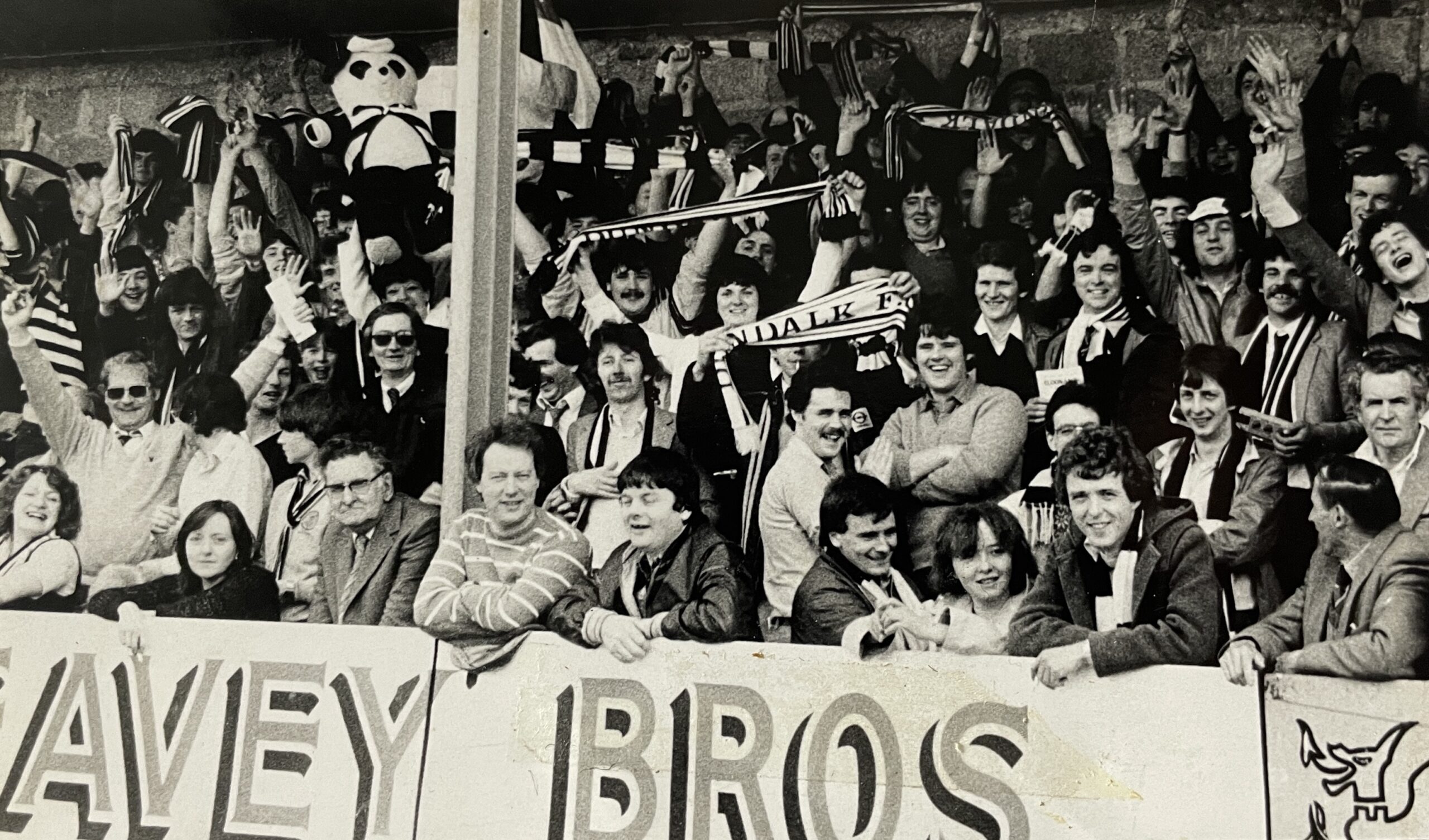
Dundalk supporters pictured at St Mel’s Park in Athlone on the final day of the 1981-82 season
There were no changes to either side for the replay at White Hart Lane on November 4th. Resplendent in an all-red away kit, this was another night to remember from McLaughlin’s men. They held Spurs for over an hour until Crooks got on the end of a Hoddle corner to score the only goal of the game and book Spurs’ passage to the next round. At the end, the 33,000 crowd acknowledged the merits of Dundalk’s performance. McLaughlin’s men had done the town – and the League of Ireland – proud, yet again.
After mixing it with Europe’s finest, it was back to the bread and butter of a new-look league. The 1981/82 campaign started with a new points system in place. A home win was rewarded with three points, a home draw one point, an away win four points and an away draw with two points. Thankfully, it lasted just one season!
Domestically, Dundalk had started with a bang. After beating champions Athlone Town to win the LFA President’s Cup, their grip on the League Cup was ended in a penalty shootout loss to Drogheda United, but they recovered in style, however, and after the opening five league games, Dundalk’s record was P5, W5, D0, L0, F14, A0, Pts 17.
The blistering start was frittered away over the next half a dozen matches, either side of the European games against Tottenham Hotspur matches. A 1-0 lead in Sligo with two minutes remaining was squandered when the home side scored twice. Seven points from six games was the reward and the run ended with a crucial 1-0 home loss to Shamrock Rovers on November 22nd, 1981. The Democrat’s headline, “Have we blown it?” seemed more a statement than a question. A 10-point deficit on leaders Bohs suggested the answer was ‘Yes’.
Before engaging Home Farm in the next league encounter, there was a Leinster Cup tie at Tolka against Bohs and the newly signed Ollie Ralph made a dream debut, bagging a hat-trick in a 3-1 win. That sparked a goal glut and Dundalk hit 17 goals in a five-game winning run. Mick Fairclough repeated Ralph’s feat with successive hat-tricks, first against Home Farm and more surprisingly in a 7-1 caning of Athlone Town. Ollie Ralph scored his first league goal for the club while Hilary Carlyle also got in on the act, breaking a two-month barren spell with two against Athlone and another pair on the next weekend in a 4-2 away win in Limerick. It was just what doctor McLaughlin had ordered and the team was surging towards the top of the table, while the main contenders were faltering.
The 3-2 win over Home Farm kickstarted a run that saw Dundalk lose just one more game over the rest of their 19 league games. When it did come, in January 1982, it was a shock; a 3-0 loss at home to a Shelbourne side who never left the basement all year and finished joint last with Thurles Town!
After defeating Finn Harps 2-0 at Oriel on St Patrick’s Day 1982, Dundalk found themselves nine points ahead of Shamrock Rovers, who had two games in hand, and three clear of Bohs, who had one game in hand. An important 1-1 draw at Milltown four days later, Sean Byrne getting the goal, left Dundalk in the driving seat with five games left to play. The two points gained proved to be vital as Rovers finished their programme with six straight wins to keep the pressure firmly on Dundalk.
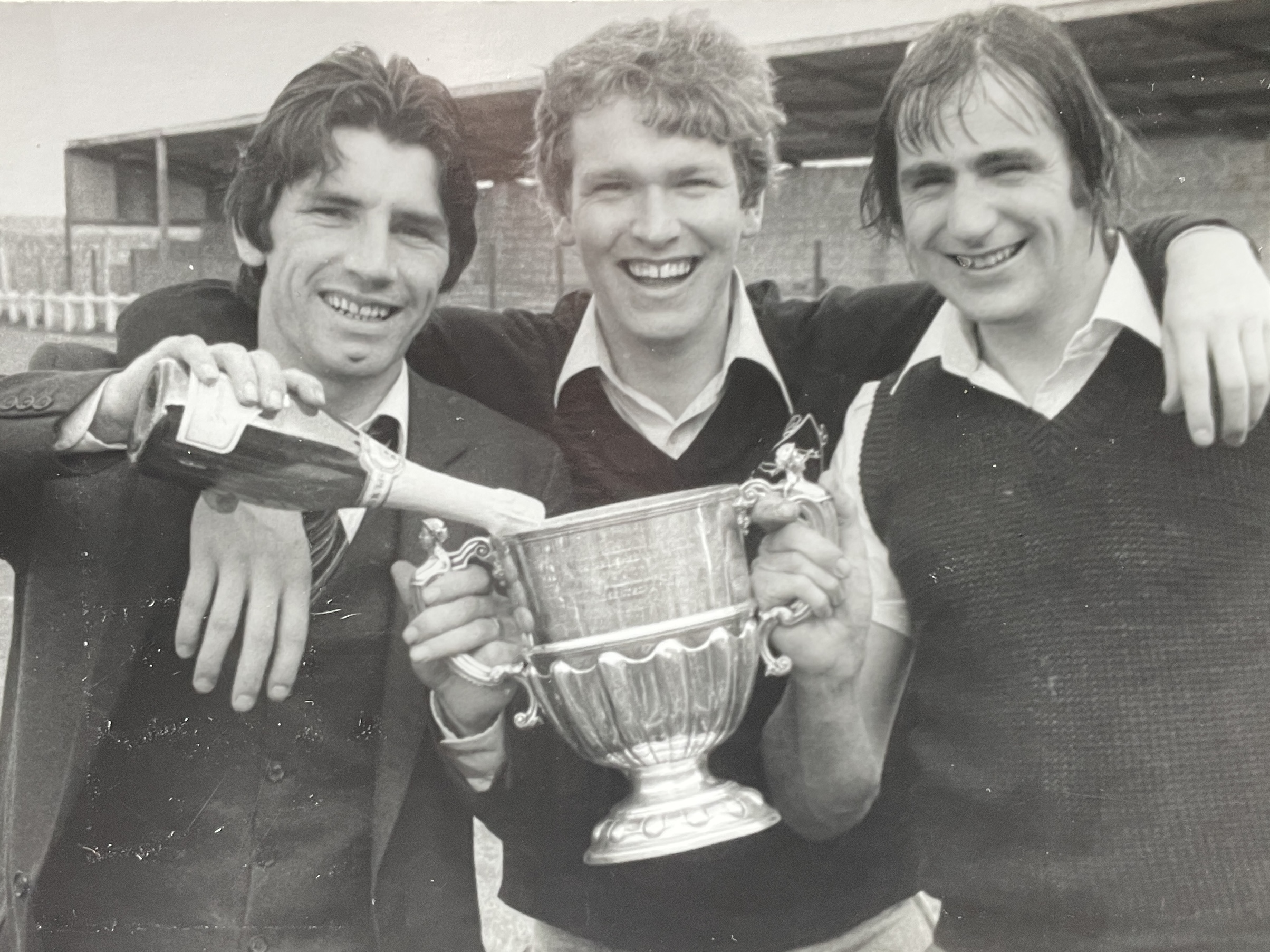
Goalscorers Sean Byrne (left) and Hilary Carlyle (right) celebrate the 1982 league win with captain Richie Blackmore at St Mel’s Park in Athlone
Byrne scored another hugely important goal to bank a 1-0 win over Limerick at Oriel Park on April 11th. It was a game that came hot on the heels of two thrilling FAI Cup semi-final ties with Bohemians that have gone down in folklore.
Tolka Park was the venue for the first game on Friday, April 2nd, 1982. Noel King gave the Gypsies a half-time lead but Dundalk’s second-half pressure paid off when Leo Flanagan’s penalty made it 1-1. The action stepped up a pace and two superb goals in the space of two minutes from Ollie Ralph and Barry Kehoe put Dundalk on the brink of the final. Bohs, however, would not lie down and goals from Jackie Jameson and David ‘Rocky’ O’Brien left the teams deadlocked at 3-3 and facing a replay at Milltown four days later.
After the highs of the first game, episode two proved to be a more combative affair and even 20 minutes of extra time failed to produce a score. There were no punches pulled in this one and Paul Doolin was sent-off for a bad tackle on Barry Kehoe but Dundalk failed to avail of the numerical advantage.
The third part of the epic quadrilogy took place at Tolka Park on Wednesday, April 14th and it proved to be another classic that equalled the first tie in its intensity, excitement and superb football. Dundalk went 1-0 up after a quarter of an hour when Sean Byrne left a trail of defenders in his wake and picked out Willie Crawley whose perfect header gave Dermot O’Neill no chance. Another FAI Cup final – and potentially another double – was beckoning for Dundalk but Derek O’Brien levelled it from Jameson’s superb pass and yet another two periods of extra time failed to separate the teams. Thankfully, in the days before penalty shoot-outs, the supporters were to get another chance to see the teams do battle again for the right to face Limerick in the cup final.
Attention quickly shifted back to the title race and going into the penultimate round of games on Sunday, April 18th, things couldn’t be any tighter at the top. Dundalk, with 72 points (28 games) led the way but Bohs 71 (27) and Shamrock Rovers 70 (28) were in hot pursuit with the new points system only adding to the drama. Both of Dundalk’s remaining two matches were away from home but they took a giant step towards the crown with a 1-0 win over St Patrick’s Athletic at Richmond Park, picking up an invaluable four points in the process, thanks to Pop Flanagan’s eighth league goal of the season.
Elsewhere, Rovers’ home win over Galway gave them three points, but Bohs squandered the advantage of having a game in hand – and ultimately the league title – by surrendering the lead and slumping to a 2-1 defeat away to Waterford. With just a potential 78 points available from their closing two games, they could not match Dundalk’s potential for 80. Nor could Rovers!
By the time Dundalk and Bohs had squared up for the next episode of their FAI Cup saga on Wednesday, April 21st, they were both heading into their sixth match in 20 days. It was standing room only at Tolka Park for the third replay and it proved to be yet another cliffhanger. For the first time in the tie, Bohs went into the lead shortly before the interval when Dave Connell’s long ball from defence found Mick Shelly and he beat a stranded Richie Blackmore.
Twenty minutes after the break, it was all level again. Ollie Ralph beat Dave Connell and sent Barry Kehoe on a surging run which ended with the maestro knocking the ball into the corner of the net. More extra time, more excitement, and three minutes into the second period, heartbreak came Dundalk’s way when Jackie Jameson fed substitute John Reynor and his unstoppable shot gave Blackmore no chance. After four games, seven-plus hours of football, 11 goals and gate receipts of £48,000 – €125,000 in today’s money – Dundalk’s double-hopes were over.
Dundalk had just four days to rest, recuperate and mentally prepare themselves for the final day of the season. After all the complicated league mathematics had been sorted out, one thing was clear. A win over Athlone Town at St Mel’s Park would put Dundalk beyond the reach of the other two, while a draw could only be matched if Bohs won their last two games.
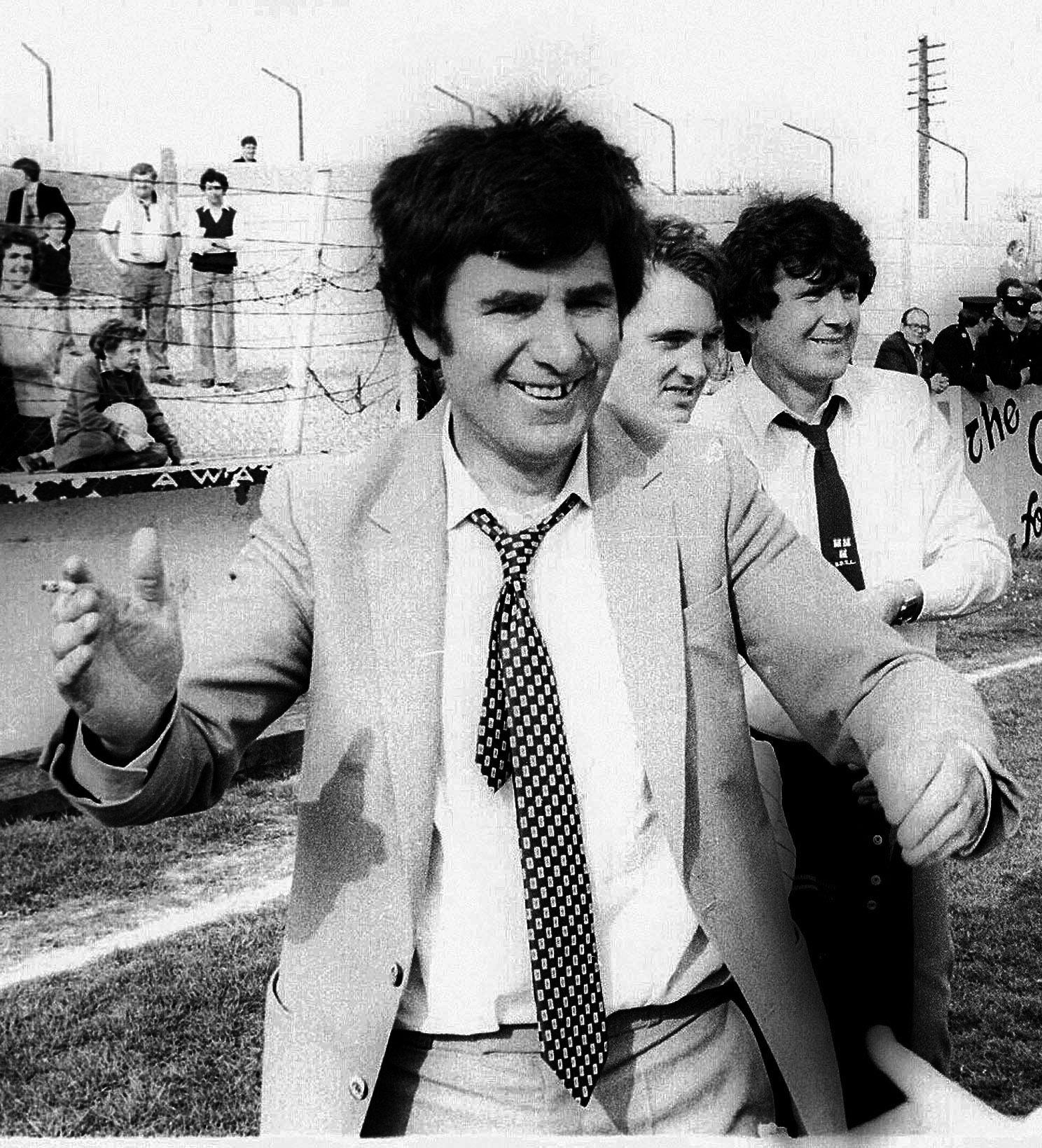
Dundalk manager Jim McLaughlin celebrates at the full-time whistle at St Mel’s Park. Willie Crawley and Mick Leech are in the background
The Lilywhites put an end to any ‘ifs’ and ‘maybes’ by getting the job done with a 2-1 win in the midlands. Hilary Carlyle, who ended the campaign with 11 goals in 22 starts, got on the end of a Leo ‘Pop’ Flanagan free-kick to score with a spectacular first-half header. Ten minutes after the change of ends, Athlone’s Denis Clarke made it all square but, appropriately, the victory, and the league title were wrapped up when Sean Byrne exchanged passes with John Archbold and galloped through to give Jim Grace no chance with 68 minutes played.
The most absorbing League of Ireland title race in years had been won in style and it was a leg-weary team, led by captain Ritchie Blackmore, who accepted the trophy and the acclamation of the large Dundalk support in the £3,000 crowd. “I could hardly watch the second half. In fact, the full 90 minutes was more like 150 minutes,” said McLaughlin afterwards. The team were given a rapturous reception when they returned to town for a celebratory function in the Imperial Hotel that night.
The final four-point winning margin was won on the back of a better away record than the other title contenders. Keeping the away losses to a single game, against Sligo during the November slump, was crucial, given the points system. Under the previous two points for a win and one for a draw system, Dundalk would have still won the title by a single point.
In many respects, this was Jim McLaughlin’s finest hour and arguably his best ever squad. The two clashes with Tottenham showed the quality and skills of his players and the FAI Cup marathon with Bohemians demonstrated their fighting spirit. Shorn of strongman Keely, the retooled defence played superbly. Gregg and Martin Lawlor fastened down the flanks and Tommy McConville, 17 seasons after his Dundalk debut, took to his new central role with Paddy Dunning with such assurance that even the mighty Tottenham were held to a single goal in two encounters.
Barry Kehoe had an outstanding season and the Byrne-Flanagan duo in the middle of the park was as effective as ever, chipping in 16 League goals between them. Ollie Ralph added an exciting option to the injury-prone duo of Fairclough and Carlyle – who still contributed with 26 league goals between them – while Willie Crawley and Jimmy Reilly supplied further local colour to the championship-winning performance.
It took another six years for the league title to return to Oriel Park. Twelve months after that win in Athlone, McLaughlin resigned, bringing a trophy-laden era that saw Dundalk win three League of Ireland titles, three FAI Cups, two League Cups, two Leinster Cups and three President’s Cups, to an end.

